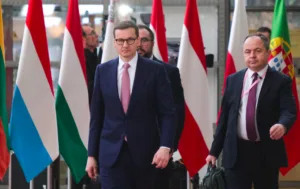Brussels – Only two days as prime minister and already “a €5 billion Christmas present” is on its way from Brussels. Poland’s newly appointed prime minister, Donald Tusk, welcomed the news of the European Commission’s work to pay Warsaw the pre-financing from the RePowerEu chapter of the National Recovery and Resilience Plan (NRPR). At a press conference together with the chairwoman of the EU executive, Ursula von der Leyen, the coalition leader reflecting at the national level precisely the Ursula majority (popular-social democrats-liberals) assured that “after the political change, we take seriously the question of the rule of law, especially when it comes to the use of European funds.” And this is where the joint work of Brussels and Warsaw starts.

The press briefing was held this morning (Dec. 15) at the Berlaymont Palace — the Commission headquarters — overlooking the European Council buildings where the 27 leaders have been confronting and clashing over crucial issues for the future of the Union for two days. “These are difficult times, but your personal commitment and your European experience will be of immense value to our family,” von der Leyen said, speaking of Tusk’s new commitment to the respect for the rule of law in the governing agenda and the “determination to address all concerns of the EU Court of Justice and the Commission.” Among the very first indications of this is the “excellent news for Polish and European citizens” to join the European Public Prosecutor’s Office (EPPO), which currently only excludes Ireland, Sweden, Hungary, and Poland itself (Denmark has opted out). The rule of law issue is also and especially crucial for Poland’s NRRP worth a total of €59.4 billion, after Brussels gave the green light to update it by adding the €24.4 billion RePowerEu chapter for energy independence (the original funds totaled to €35.4 billion, 22.5 billion in grants and 11.5 in loans). “I want to share the news that the Commission is working to transfer €5 billion in pre-financing to Poland by the end of the year,” von der Leyen stressed, emphasizing the support for Warsaw to “modernize its energy system and foster decarbonization.” An “essential priority” that the number one EU chief forcefully reiterated, for which “we need Poland on board.” Continuing the reference to the coincidence with the Christmas holiday period, the Polish premier acknowledged that “this is not a small gift, these are important funds that will be used to increase our energy sovereignty” and the new government will “do its utmost to spend this money appropriately” in line with the rule of law: “Without confidence in the restoration of the rule of law, the Commission would not have taken this decision,” Tusk said.

Polish Prime Minister Donald Tusk at the European Council (15 dicembre 2023)
“We have to work hard, but I am confident that we can resolve all the issues on the rule of law that for too long have prevented us from helping Poland implement the dual digital and green transition,” said President von der Leyen, also making it known that “we have finally received the first payment request” under the Next Generation EU. Work will now focus on “reaching the milestones on judicial independence so that we can proceed with the payment,” the EU chief pointed out. The Polish premier acknowledged that “the decision is the Commission’s, but the biggest authors of this success are all those who never gave up, who fought for the rule of law in Poland.” Lawyers, judges, magistrates, and citizens who “never allowed to break the rules and who in their capacities tried to resolve the issue.”Change is now “taking place,” and EU funds “will start coming” to Warsaw. “Our place is in Europe,” Tusk concluded.
Tusk’s challenge on rule of law in Poland
After the (at least momentarily) end of the power of the Law and Justice party of the former prime minister Mateusz Morawiecki, Warsaw has headed with Tusk down a path of realigning standards of respect for the rule of law, which in the past two years have strained relations with Brussels. Since 2021 there has been an ongoing legal dispute brought about by two rulings of the Constitutional Court of Poland: the first on July 14, when the Warsaw judges rejected the EU regulation allowing the EU Court of Justice to rule on the “systems, principles and procedures” of Polish courts, the second on Oct. 7, when the Constitutional Court questioned the primacy of EU law, calling Articles 1 and 19 of the Treaty on European Union (TEU) and several rulings of EU courts “incompatible” with the Polish Constitution.

Former Polish Prime Minister, Mateusz Morawiecki
At the center of the dispute is the decision to provisionally suspend the powers of the disciplinary section of the Supreme Court of Poland due to several arbitrary measures against magistrates that the ruling majority disliked. While infringement proceedings by the European Commission are underway, the EU Court of Justice has ordered the member country to pay one million euros in fines per day: the bill has already risen over half a billion euros – 526 million to be exact – from October 27, 2021, to April 14, 2023. On the same day of the ousting of former premier Morawiecki at the national Parliament for a new term as premier, Poland’s Constitutional Court declared unconstitutional the fines imposed on justice and the lignite mine in Turów, aggravating the dispute with Brussels.
English version by the Translation Service of Withub





